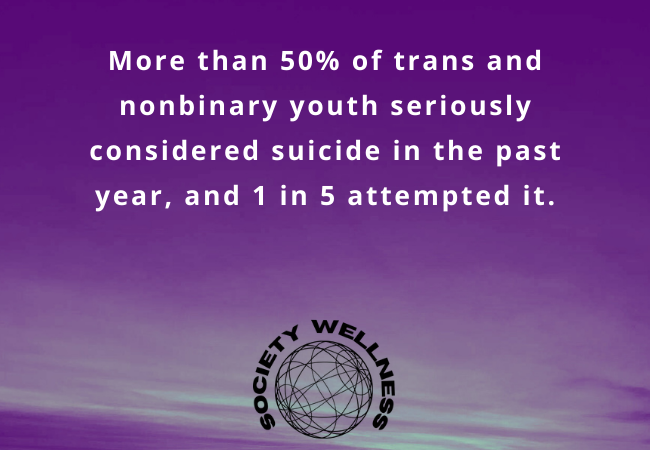In a world that often erases or invalidates the existence of trans and nonbinary individuals, mental health care that affirms identity is not just helpful—it’s essential. While many therapeutic approaches offer general mental health support, queer therapy is uniquely designed to validate, uplift, and center the lived experiences of transgender, nonbinary, genderqueer, and gender-expansive individuals.
At LGBTQ Behavioral Health Treatment Center Massachusetts, we provide comprehensive, identity-affirming care through our LGBTQ Therapy in Massachusetts, LGBTQ Queer Therapy in Massachusetts, LGBTQ Couples and Marriage Counseling, and structured programs like LGBTQ PHP Treatment and LGBTQ Intensive Outpatient Programs. This blog explores how queer therapy meets the specific needs of trans and nonbinary people—and why it matters now more than ever.
The Mental Health Crisis Among Trans and Nonbinary Individuals
Trans and nonbinary individuals face a disproportionate risk of mental health challenges—not because of their gender identity, but because of systemic discrimination, societal stigma, and lack of access to affirming care.
National Statistics:
- 41% of transgender adults have attempted suicide, compared to 4.6% of the general population
(U.S. Transgender Survey, 2015) - 56% of trans and nonbinary youth experience symptoms of depression, and over 50% report seriously considering suicide in the past year
(The Trevor Project, 2023) - More than 60% of trans individuals report avoiding medical or mental health care due to fear of mistreatment
(Kaiser Family Foundation, 2022)
These alarming numbers reflect a deep need for culturally competent, gender-affirming therapy—something queer therapy provides with intention and care.
What Is Queer Therapy and Why Is It Different?
Queer therapy is a form of mental health care that affirms LGBTQ+ identities while directly addressing the trauma, stigma, and societal challenges queer individuals face.
Key Features of Queer Therapy:
- Affirming language and practice (correct names, pronouns, and respect for gender identity)
- Trauma-informed care specific to LGBTQ+ and gender minority experiences
- Intersectional approach that considers race, class, disability, neurodiversity, and culture
- Non-pathologizing frameworks that see gender diversity as a natural part of human identity
In contrast to conventional models that often assume a cisgender or heterosexual norm, queer therapy understands that the client is not the problem—societal oppression is.
How Queer Therapy Specifically Supports Trans and Nonbinary People
1. Affirming Gender Identity
Misgendering and invalidation are daily stressors for trans and nonbinary people. In queer therapy, identity is celebrated—not questioned.
Therapists:
- Use correct pronouns and chosen names
- Understand the spectrum of gender beyond the binary
- Explore identity fluidity without judgment
- Normalize the process of exploring, shifting, or redefining gender over time
2. Navigating Gender Dysphoria
Gender dysphoria can be debilitating and isolating. Therapy helps clients:
- Understand and manage their dysphoric experiences
- Learn grounding and body-affirming techniques
- Build supportive routines and self-care strategies
- Decide if and when medical or social transition steps are right for them
Clients are never pressured to pursue any form of transition—therapy is about choice, empowerment, and individualized care.
3. Healing from Trauma and Rejection
From childhood bullying to family estrangement, trans and nonbinary individuals often carry complex trauma. Queer therapy uses:
- EMDR for identity-based PTSD
- Dialectical Behavior Therapy (DBT) for emotional regulation
- Narrative therapy to reframe internalized transphobia
Therapists offer a validating environment where clients are free to express anger, grief, or fear—without being labeled “too much.”
4. Processing Internalized Transphobia and Shame
Growing up in a cisnormative world often leads to internalized messages of “not being enough.” Therapy helps clients:
- Identify internalized beliefs about gender and worth
- Reframe self-blame or guilt around transition
- Develop self-love and gender euphoria
Clients learn not only to survive but to celebrate who they are.
Support Through Structured Programs: PHP & IOP
In addition to individual therapy, our LGBTQ Behavioral Health Treatment Center in Massachusetts offers two critical levels of care tailored to the LGBTQ+ community.
LGBTQ PHP Treatment in Massachusetts (Partial Hospitalization Program)
For individuals experiencing acute mental health distress—such as suicidal thoughts, severe dysphoria, or trauma flashbacks—our PHP program provides full-day care in a structured, therapeutic setting.
PHP Includes:
- Daily group therapy focused on identity, trauma, and self-expression
- Individual therapy 2–3 times per week
- Psychiatric evaluation and medication management if needed
- Safe spaces for trans and nonbinary clients to process openly
Clients receive immersive support while returning home each evening—a vital balance between intensive care and real-life integration.
LGBTQ Intensive Outpatient Program in Massachusetts (IOP)
Our IOP is designed for clients who are stepping down from PHP or who need more structure than weekly therapy provides.
IOP Includes:
- Flexible day or evening groups 3–5 times per week
- Skill-building in self-advocacy, boundary setting, and emotional regulation
- LGBTQ-affirming peer support and therapeutic processing
- Workshops on navigating gender expression, healthcare systems, and relationships
Both programs are deeply affirming and designed to meet clients where they are in their gender journey.
Queer Therapy in Relationships: Navigating Gender in Intimacy
Gender identity doesn’t exist in a vacuum—it affects how individuals show up in their relationships. Our LGBTQ Couples and Marriage Counseling in Massachusetts offers support to:
- Couples where one or more partners are transitioning
- Nonbinary and mixed-gender relationships navigating social pressures
- Partners learning to affirm each other amid change
Therapists help couples:
- Develop communication tools for discussing gender and intimacy
- Manage external challenges like family rejection or misgendering
- Strengthen emotional connection during transition or identity shifts
Queer therapy provides couples with the language and tools to support each other deeply and authentically.

Exploring Medical Transition in a Therapeutic Setting
For clients considering hormone therapy, top or bottom surgery, or other medical transitions, queer therapy offers:
- A non-judgmental space to explore hopes, fears, and expectations
- Support in making informed, autonomous decisions
- Emotional preparation for physical changes
- Referrals for gender-affirming medical care (when desired)
- Letter writing for medical access (if required)
Your therapist is your advocate—not a gatekeeper. Medical decisions are always client-led.
Addressing Intersectionality: Identity Within Identity
Being trans or nonbinary is only one facet of identity. Clients may also experience:
- Racism and colorism
- Ableism or neurodivergence stigma
- Religious trauma
- Immigration status challenges
We honor these intersections with culturally competent care. Our therapists don’t just understand gender—they understand how race, class, faith, and disability impact your lived experience.
Why Choose LGBTQ Behavioral Health Treatment Center in Massachusetts?
We are one of the few centers in New England offering dedicated mental health programming for trans and nonbinary people, including:
- Licensed LGBTQ+ and allied clinicians trained in gender-affirming care
- Trauma-informed approaches rooted in consent and safety
- Multilevel treatment: outpatient, IOP, PHP
- Safe, inclusive spaces with affirming group therapy
- Support for medical, social, or non-transition journeys
- LGBTQ peer support and community-building
Conclusion
Being trans or nonbinary is not a problem to be solved. The real challenge is living in a world that tries to suppress your truth. But healing is possible—and it starts with being fully seen.
At LGBTQ Behavioral Health, we offer therapy that reflects your truth, honors your journey, and helps you build a life of purpose and pride. Call us today at 888.964.8116 Our team is ready to support your healing—because your identity deserves celebration, not survival.
FAQ on Queer Therapy
What is queer therapy and how does it help trans and nonbinary individuals?
Queer therapy is an affirming approach to mental health that validates gender identity, supports healing from dysphoria and trauma, and helps trans and nonbinary people navigate identity, relationships, and self-worth without judgment.
How is LGBTQ Queer Therapy in Massachusetts different from traditional therapy?
Unlike traditional models, queer therapy affirms gender diversity, uses inclusive language, and addresses unique LGBTQ+ experiences like misgendering, dysphoria, coming out, and transition—all in a culturally competent environment.
Can queer therapy help with gender dysphoria?
Yes. Queer therapy provides coping tools for managing gender dysphoria, builds body-neutral or body-positive practices, and offers support for medical or social transitions when desired.
What’s the role of LGBTQ PHP Treatment in Massachusetts for trans and nonbinary individuals?
Our Partial Hospitalization Program (PHP) offers structured, full-day therapeutic care, ideal for those dealing with identity-based trauma, suicidal ideation, or severe mental health challenges in a safe, affirming space.
What can I expect from LGBTQ Intensive Outpatient Programs (IOP) in Massachusetts?
IOP provides flexible, part-time therapeutic support through group and individual therapy tailored to trans and nonbinary individuals managing dysphoria, anxiety, trauma, or transition-related stress.
Is LGBTQ Couples and Marriage Counseling inclusive of gender-diverse relationships?
Absolutely. Our couples therapy supports all forms of queer relationships, including those navigating gender transition, communication challenges, or intimacy concerns rooted in identity changes.
Does queer therapy help with internalized transphobia?
Yes. Queer therapy helps identify and challenge internalized messages of shame or inferiority, rebuilds self-acceptance, and fosters gender pride and authenticity.
Can queer therapy support someone exploring gender for the first time?
Yes. Whether you’re questioning, newly out, or re-defining your identity, queer therapy offers a safe space to explore gender without pressure, assumptions, or expectations.

